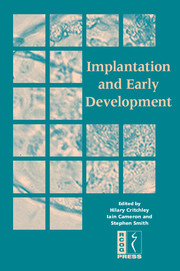Book contents
- Frontmatter
- Contents
- DECLARATION OF INTEREST
- Participants
- Preface
- SECTION 1 PREPARATION FOR IMPLANTATION – THE UTERINE ENVIRONMENT
- SECTION 2 THE EMBRYO
- SECTION 3 LESSONS FROM ANIMAL MODELS (TRANSGENICS) AND NOVEL TECHNOLOGIES
- SECTION 4 CLINICAL SEQUELAE
- 17 Sporadic early pregnancy loss: aetiology and management
- 18 Recurrent miscarriage – the role of prothrombotic disorders
- 19 Reproductive disorders and pregnancy outcome
- 20 Risk factors for first-trimester miscarriage: summary of results from the National Women's Health Study
- 21 Single-embryo transfer
- 22 Paediatric outcome after assisted reproductive technology
- SECTION 5 CONSENSUS VIEWS
- Index
20 - Risk factors for first-trimester miscarriage: summary of results from the National Women's Health Study
from SECTION 4 - CLINICAL SEQUELAE
Published online by Cambridge University Press: 05 June 2014
- Frontmatter
- Contents
- DECLARATION OF INTEREST
- Participants
- Preface
- SECTION 1 PREPARATION FOR IMPLANTATION – THE UTERINE ENVIRONMENT
- SECTION 2 THE EMBRYO
- SECTION 3 LESSONS FROM ANIMAL MODELS (TRANSGENICS) AND NOVEL TECHNOLOGIES
- SECTION 4 CLINICAL SEQUELAE
- 17 Sporadic early pregnancy loss: aetiology and management
- 18 Recurrent miscarriage – the role of prothrombotic disorders
- 19 Reproductive disorders and pregnancy outcome
- 20 Risk factors for first-trimester miscarriage: summary of results from the National Women's Health Study
- 21 Single-embryo transfer
- 22 Paediatric outcome after assisted reproductive technology
- SECTION 5 CONSENSUS VIEWS
- Index
Summary
Background
Miscarriage is a common event but is remarkably difficult to study epidemiologically. Most investigations report that around one in five clinical pregnancies will end in miscarriage (fetal death before 24 weeks), while prospective studies of conception and early pregnancy have reported fetal loss rates approaching one-third. Well-established risk factors for miscarriage include increased maternal age, previous history of miscarriage, and infertility, but the interaction between age, parity, infertility and previous pregnancy loss is complex and not entirely understood. Furthermore, several behavioural and social risk factors have been reported as increasing the risk of miscarriage but most remain controversial or unconfirmed.
Methods
The National Women's Health Study was a population-based, two-stage, postal survey of reproductive histories of adult women living in the UK in 2001, sampled from the electronic electoral roll. In Stage 1 a short ‘screening’ questionnaire was sent to over 60000 randomly selected women in order to identify those aged below 56 years who had ever been pregnant or ever attempted to achieve a pregnancy. A brief reproductive history was requested and the data on stillbirth, multiple birth and maternal age were compared with national data in order to assess response bias.
Keywords
- Type
- Chapter
- Information
- Implantation and Early Development , pp. 253 - 255Publisher: Cambridge University PressPrint publication year: 2005



